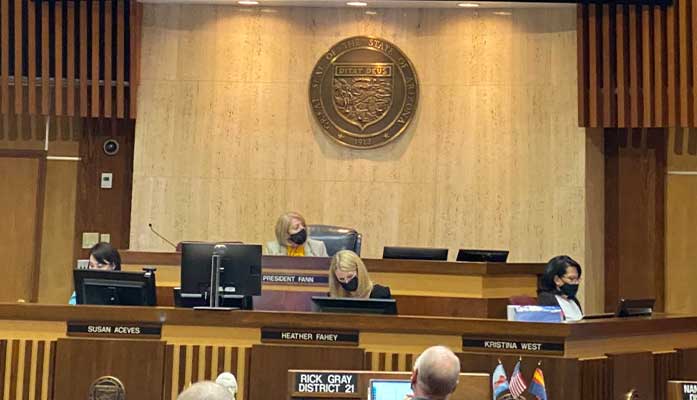
by Corinne Murdock | Feb 16, 2022 | News
By Corinne Murdock |
This week, the Senate Appropriations Committee passed a plan to attract the film industry to Arizona. SB1708, introduced by State Senator David Gowan (R-Sierra Vista), would offer a tax rebate to movie studios, called “Credit for Motion Picture Production Costs,” or “Tax Credits,” under an “Arizona Motion Picture Production Program.” The committee passed the bill overwhelmingly, 9-1; only State Senator Kelly Townsend (R-Mesa) opposed the bill.
The bill reads like a promotional deal for a store: if a company spends up to $10 million, then they get 15 percent in tax credits. If they spend between $10 and $35 million, then they get $17.5 percent. And if they spend over $35 million, then they get 20 percent. Companies could get more: an additional 2.5 percent for total production labor costs associated with Arizonan employees, an additional 2.5 percent of total qualified production costs associated with filming at a qualified production facility in Arizona or primarily on location, and an additional 2.5 percent of total qualified production costs if they filmed in association with a long-term tenant of a qualified production facility.
A day after the committee’s decision, Arizona Free Enterprise Club Vice President Aimee Yentes told “The Conservative Circus” that the credits would be lining the pockets of “woke Hollywood elites” making movies that oppose American traditions and values.
“It outtakes $150 million a year of tax credits for production companies and producers, that’s a really, I would call, generous tax credit program. Usually these move through the system and you’ll see them for, I don’t know, $7 million here, $12 million here, but $150 million a year going to woke Hollywood elites who are going to produce anti-American movies and documentaries like Michael Moore’s,” said Yentes. “So if that sounds like a good use of your taxpayer money, I shudder to think.”
Yentes explained further that the bill gifted movie companies with a “sweetheart deal” through refundable tax credits, which zero out liability after the threshold is met. If there are excess tax credits that haven’t been used, the government will pay the difference to the companies — a perk not afforded to small Arizonan business owners.
“That’s [a deal] a lot of other businesses would love but they can’t afford while down there to cut their own deals,” said Yentes.
According to Yentes, the deals wouldn’t stop there. She said that movie companies’ promises to film in Arizona over this legislation were mere sweet nothings; she insisted that those executives would go back on their word as soon as another state offered a better deal.
“It is an absolute race to the bottom,” said Yentes. “We will wind up bidding against ourselves — and lose.”
Arizona has a history with Hollywood that goes beyond the filming of the many Westerns that ruled the 20th century entertainment industry. The following movies filmed in various parts of Arizona: the original “War of the Worlds,” the original and reboot “Planet of the Apes,” “National Lampoon’s Vacation,” “Indiana Jones and the Temple of Doom,” the original “Karate Kid,” “Revenge of the Nerds,” “Can’t Buy Me Love,” “Bill & Ted’s Excellent Adventure,” “Wayne’s World,” “Forrest Gump,” “The Shawshank Redemption,” “Star Trek: First Contact,” “Star Trek Generations,” “Transformers,” “Transformers: The Last Knight,” and “Transformers: Revenge of the Fallen.”
More recently, Disney’s “The Lone Ranger” was filmed in Chinle.
Corinne Murdock is a reporter for AZ Free News. Follow her latest on Twitter, or email tips to corinne@azfreenews.com.

by Corinne Murdock | Feb 16, 2022 | News
By Corinne Murdock |
Both the House Health and Human Services (HHS) and Education Committees approved a bill preventing K-12 schools from requiring the COVID-19 vaccine for attendance. HB2086 passed narrowly along party lines: 5-4 in the former, 6-4 in the latter.
State Representative Joanne Osborne (R-Goodyear) insisted during the Education Committee hearing on Tuesday that this bill safeguards parental rights. Osborne relayed how she heard that some high schools were considering masking mandates for student athletes.
“Some may ask why is this necessary now? It’s not being mandated. I want to make sure it stays that way,” said Osborne. “I’m not a health physician, but I am a parent. I am speaking up because this is not a childhood disease. I’m not an anti-vaxxer, but I am going to say to parents: talk to your doctors about this.”
Osborne clarified that she wasn’t opposed to vaccination requirements for other diseases, because traditional vaccinations have been established for their safety and efficacy for years.
State Representative Lupe Diaz (R-Hereford) said the vaccination requirement reminded him of China’s social credit system, and insisted that vaccination requirements for participation in public systems was tantamount to weaponization.
State Representative John Fillmore (R-Apache Junction) noted that this was only a “tiny step toward freedom.”
As a rebuttal to the logic of the bill, State Representative Judy Schwiebert (D-Phoenix) said that broad vaccine exemptions are already in place, calling the bill “redundant.” State Representative Daniel Hernandez (D-Tucson) added onto Schwiebert’s argument, arguing that Arizona already has strong parental choice laws in other regards, such as school choice.
During the HHS Committee meeting last week, State Representative Melody Hernandez (D-Tempe) said that forcing quarantine for healthy students who aren’t sick is important to keep everyone around the children safe. Hernandez claimed that the opt-out process was sufficient for parental choice.
However, Heather Rooks, a mother of four, pointed out during the Education Committee that even with religious or medical exemptions, unvaccinated students may be forcibly quarantined with an outbreak, which the state defines as two or more cases. Committee policy aides verified that this was correct.
State Representative Beverly Pingerelli (R-Peoria), a Peoria Unified School District (PUSD) governing board member, declared that children had suffered too much already.
Corinne Murdock is a reporter for AZ Free News. Follow her latest on Twitter, or email tips to corinne@azfreenews.com.

by Corinne Murdock | Feb 16, 2022 | News
By Corinne Murdock |
The Arizona Senate passed a bill requiring public entities — the meaning of which was expanded to include state universities and community college districts — to divest from companies boycotting Israel.
Specifically, SB1250 would require public entities to take action within three months of the state treasurer releasing its restricted company list, a record of companies that boycott Israel. As AZ Free News reported last September, Treasurer Kimberly Yee announced that the state wouldn’t invest funds in the ice cream company Ben & Jerry’s for its Israel boycott, which violated state law. Furthermore, under SB1250 all public entities would also be required to publish a list of investments sold, redeemed, divested, or withdrawn on its website annually. Those public entities would be indemnified and held harmless for divesting from the companies.
About half of the Senate Democrats voted against the bill: Assistant Minority Leader Lupe Contreras (D-Avondale), Minority Whip Martin Quezada (D-Glendale) and State Senators Sally Ann Gonzales (D-Tucson), Theresa Hatathlie (D-Coal Mine Canyon), Lisa Otondo (D-Yuma), and Raquel Teran (D-Phoenix).
The remainder of the Senate Democrats expressed support or opted not to vote at all. Minority Leader Rebecca Rios (D-Phoenix), Minority Whip Victoria Steele (D-Tucson), and State Senators Lela Alston (D-Phoenix), Sean Bowie (D-Chandler), Rosanna Gabaldon (D-Sahuarita), and Christine Marsh (D-Phoenix) voted for the bill; State Senators Juan Mendez (D-Tempe) and Stephanie Stahl Hamilton (D-Tucson) didn’t vote.
During the Senate Finance Committee hearing last week, State Representative David Gowan (R-Sierra Vista) criticized the constituents, several of whom were college students, that claimed the state of Israel has engaged in an “apartheid regime” against the Palestinians.
“I know what real history is, and you want to talk about apartheid let’s talk about Hitler and the Jews and the Nazis back in Germany,” said Gowan. “This movement is just another attack on the Jewish society. I mean you see it throughout history itself. It’s a horrible situation that we have to reteach, reteach, reteach because we forget about our past. But remember when you forget the past, you’re gonna repeat it. We want to stop this now so we don’t repeat our past.”
Corinne Murdock is a reporter for AZ Free News. Follow her latest on Twitter, or email tips to corinne@azfreenews.com.

by Corinne Murdock | Feb 15, 2022 | News
By Corinne Murdock |
The Arizona Senate approved a bill to limit abortions after 15 weeks, SB1164, with punishment reserved for physicians providing the abortions and not the mother of the unborn child. Abortions past 15 weeks could be performed in the event that a mother’s life is determined to be at stake, but the physician must file a report with the Department of Health Services (DHS).
The bill sponsor, State Senator Nancy Barto (R-Phoenix), has been invested in phasing out abortion entirely. Barto was the sole state legislator outside the Supreme Court hearing for Dobbs v. Jackson Women’s Health Organization, which considers the legality of Roe v. Wade precedent, the ruling that legalized abortion nationwide.
Barto called her bill a “common-sense limit,” but lamented that the bill didn’t go far enough.
Barto did concede that the bill was still an opportunity to protect more women from late-term abortions, saying it was “honoring life and protecting women.” Barto criticized Planned Parenthood for not using its millions to help women with unplanned pregnancies,
“15 weeks? That puts Arizona in league with China and North Korea,” said Barto.
Senate Democrats defended the decision to end an unborn child’s life as the personal decisions of parents. State Senator Christine Marsh (D-Phoenix) said that the state of Arizona couldn’t put barriers on abortion until there’s a way to stop rape and incest for good.
State Senator Sally Ann Gonzales (D-Tucson) said that unborn children could be “a burden” to families.
“We ought not be supporting bills like this that really place not only a burden onto families but, as I always like to say, it’s really placing our own individual values and beliefs onto all the women of this state,” said Gonzalez.
State Senator Rosanna Gabaldon (D-Sahuarita) said she wanted to be proud to be part of a state that allows families to make the decisions of what their families look like. Gabaldon expressed a wish that the question of abortion would no longer be subject to moral debate but rather an accepted good.
“I want to live in a world where we respect other people’s decisions,” said Gabaldon. “I want one day for Arizona to look back and say, ‘Why did we have a problem with this?’”
State Senator Raquel Teran (D-Phoenix) compared Arizona women’s plight with unplanned pregnancies to the women of El Salvador under their strict abortion ban in place since 1998. Teran insinuated that the third-world justice system practices of El Salvador would befall Arizonans. She called the bill an “injustice.”
State Senator Stephanie Stahl-Hamilton (D-Tucson) claimed to be a Christian and that the Bible supported abortion.
SB1164 now heads to the House for consideration.
Corinne Murdock is a reporter for AZ Free News. Follow her latest on Twitter, or email tips to corinne@azfreenews.com.

by Corinne Murdock | Feb 15, 2022 | Education, News
By Corinne Murdock |
The House will soon vote on a bill to allow college faculty and students to carry and possess firearms on campus property. The bill, HB2447, would only require that faculty and students submit notification to their administration that they are armed and possess a concealed carry permit. In the state of Arizona, individuals must be 21 or older to receive a valid concealed carry permit, or 19 and older for active military and veterans. The bill would extend to all higher education campuses — community colleges as well as four-year colleges and universities — and require them to adopt guidelines for firearm usage during an active shooter situation.
The House Rules Committee passed the bill on Monday. The House Judiciary Committee passed the bill last month along party lines, 6-4.
While House Judiciary Committee Republicans viewed the bill as a further defense of Second Amendment rights and increased, committee Democrats conveyed concern that allowing more guns on campuses would decrease safety. The bill sponsor, State Representative Quang Nguyen (R-Prescott Valley), cited how Texas passed a bill ensuring the same rights in 2016, SB11. Nguyen serves as the Arizona Rifle and Pistol Association president currently and is a certified CCW instructor, firearms safety instructor, rifle coach, and previously a state director for a junior rifle team overseeing competitors aged 12 to 20.
Arizona State University (ASU) Police Chief Michael Thompson insisted that college students lack the maturity to carry a firearm. Thompson said that students should leave it up to the professionals on campus: law enforcement and security.
“The notion that a CCW training is going to prevent some kind of mass shooting on campus is a fantasy,” said Thompson. “They are still in a very developmental stage in their lives, and they tend to not think through consequences and have issues with their actions at many occasions. It’s increasing and adding a risk to a campus that’s not necessary.”
Chairman Walt Blackman (R-Snowflake) explained that while in the military he oversaw platoons of hundreds of young men in the very age bracket that Thompson criticized: 18 to 23 years old. Blackman said that, based on his experience, he disagreed with Thompson’s assessment that college students
Thompson rebutted that the 18 to 23 years old in the military are soldiers “with training and supervision,” whereas those in college would be “intoxicated” and “in their dorm room, showing off rifles and handling pistols.”
Nguyen’s subsequent line of questioning prompted a heated exchange between the legislator and Thompson.
Nguyen responded that Thompson’s characterization of ASU’s climate made the case for necessitating concealed carry. He added that young adults may vote and even be drafted to serve in the military at 18, and cited his own daughter as an example, who finished six weeks of boot camp before turning 18 and received a firearm as part of her assignment.
“You kind of scare me when you start talking about kids drinking and doing drugs and being irresponsible. You just made a case for me to not send my kids to ASU,” said Nguyen. “Or you’re making the case for me that if I send my 21-year-old daughter to ASU, she should be armed to protect herself from all the drugs and the drug users on campus.”
Thompson said that his issue wasn’t with concealed carry generally, but with the ability for any states’ concealed carry permit to be permissible for use on college campuses. Nguyen questioned Thompson why concealed carry permits existed at all if those permits were questionable, or why Arizona allows reciprocity.
Minority Whip Domingo DeGrazia (D-Tucson) expressed concern that concealed carry permits may be obtained through an online course and a 15-minute interview with an instructor.
Corinne Murdock is a reporter for AZ Free News. Follow her latest on Twitter, or email tips to corinne@azfreenews.com.

by Terri Jo Neff | Feb 14, 2022 | News
By Terri Jo Neff |
A Senate Bill which expands the definition of a public establishment under Arizona’s terrorism laws cleared its third reading in the Senate on a 28 to 0 vote Monday and has been transmitted to the House for action.
SB1332 sponsored by Sen. Warren Petersen (R-LD12) would amend Arizona Revised Statute 13-2301(C)(10) which defines what a public establishment is for purposes of prosecuting someone for criminal acts of terrorism.
The current definition is limited to “a structure, vehicle or craft that is owned, leased or operated by” the State or a political subdivision of the State including school districts; a public agency; the federal government; or a health care institution. Petersen’s bill seeks to add a private educational institution to the entities considered to be a public establishment under Arizona’s criminal code.
The strong bipartisan support for SB1332 is evident by its unanimous passage in the Senate Judiciary Committee earlier this month. It received a Proper for Consideration report from the Senate Rules Committee on Feb. 7 and went through both Senate caucuses the next day.
Under ARS 13-2301(C)(12)(b), terrorism includes any completed or preparatory offense which involves the use of a deadly weapon or a weapon of mass destruction or the intentional or knowing infliction of serious physical injury with the intent to cause “substantial damage to or substantial interruption of public communications, communication service providers, public transportation, common carriers, public utilities, public establishments, or other public services.”






